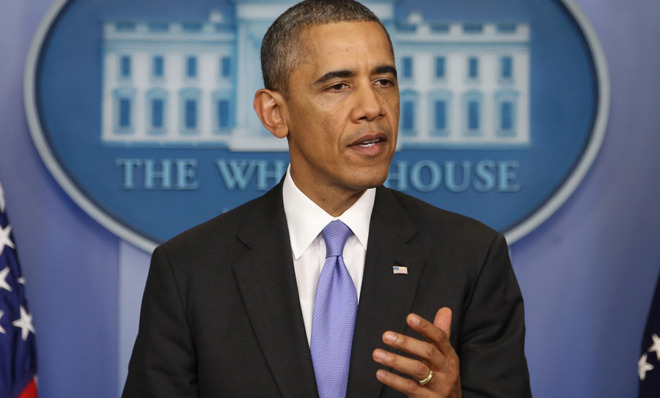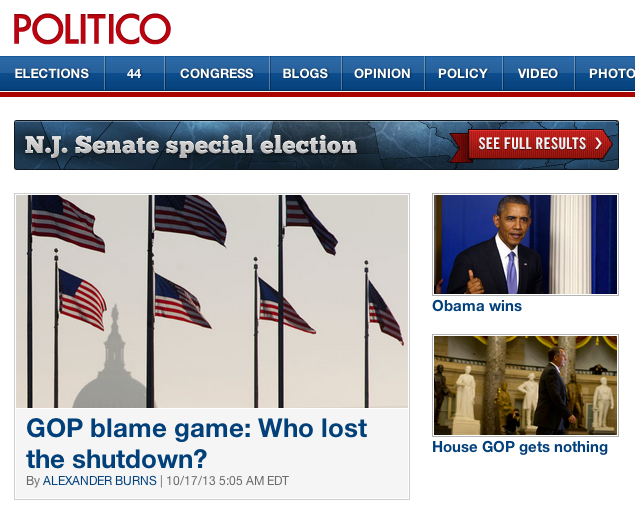Why Democrats didn't blink first in the shutdown stare-down
Democrats aren't exactly known for party unity. So why did they stick together this time?


A free daily email with the biggest news stories of the day – and the best features from TheWeek.com
You are now subscribed
Your newsletter sign-up was successful
If you want to know the score in Washington, you could do worse than checking with the scorekeepers at Politico. Here's how they judged the end of the government shutdown and debt ceiling brinksmanship:

Or, to put that another way:
It's hard to argue with the conventional wisdom. President Obama said he wouldn't negotiate over the debt limit or funding the government, and he "achieved both goals, with minuscule concessions," says John Dickerson at Slate. "In the crude analogy of two cars playing chicken, the president's opponents pulled over." Obama was helped by the civil war raging in the Republican Party, but "the president and his fellow Democrats benefited in this round largely because they were united," also.
The Week
Escape your echo chamber. Get the facts behind the news, plus analysis from multiple perspectives.

Sign up for The Week's Free Newsletters
From our morning news briefing to a weekly Good News Newsletter, get the best of The Week delivered directly to your inbox.
From our morning news briefing to a weekly Good News Newsletter, get the best of The Week delivered directly to your inbox.
That's no small feat. "Democrats in Congress don't have a great reputation for party unity," says Jonathan Cohn at The New Republic. But there they were: "Obama held his ground — in public and in private. On Capitol Hill, Democrats from both chambers and both wings of the party said the same things and, behind the scenes, coordinated their actions." What was different this time?
Part of it has to do with how the party's congressional makeup has changed in the past few years. A lot of conservative House Democrats were unseated in the 2010 election, says Cohn, and "the Senate Democratic caucus has bid farewell to Blanche Lincoln, Kent Conrad, Ben Nelson, and Joe Lieberman — all more conservative and all (but particularly Lieberman) inclined to make trouble for party leadership." The remaining conservatives, like Sen. Joe Manchin (D-W.V.) got "plenty of political cover" from moderate GOP colleagues criticizing the shutdown.
Still, in this case, Democrats may not have been able to stay together without the help of an unlikely ally, Sen. Ted Cruz (R- Texas), says Ezra Klein at The Washington Post. Not only did Cruz's tactical push to link ObamaCare to the federal budget fracture the GOP, but it was also "so suicidal that Democrats felt comfortable forcing Republicans to cave completely." In fact, Democrats got way more in the deal than they thought possible before the shutdown.
Cruz has been so helpful, Klein says, that "a true cynic about American politics" might have to conclude that he's "a Democratic sleeper agent."
A free daily email with the biggest news stories of the day – and the best features from TheWeek.com
Cruz's assumption that Obama and the Democrats would bend wasn't crazy, says Jonathan Chait at New York. It was the "widespread, world-weary conventional wisdom." And Republicans "spent weeks prodding for every weakness" in the Democratic caucus. To no avail. The GOP's single biggest mistake, Chait adds, was "failing to understand the way its behavior would create unity in the opposing party."
Part of what undergirded Democratic unity went beyond a (correct) calculation that it would be dangerous to pay any ransom at all. Democrats seemed to share a genuine moral revulsion at the tactics and audacity of a party that had lost a presidential election by 5 million votes, lost another chance to win a favorable Senate map, and lost the national House vote demanding the winning party give them its way without compromise. [New York]
Peter has worked as a news and culture writer and editor at The Week since the site's launch in 2008. He covers politics, world affairs, religion and cultural currents. His journalism career began as a copy editor at a financial newswire and has included editorial positions at The New York Times Magazine, Facts on File, and Oregon State University.
-
 Samurai: a ‘blockbuster’ display of Japanese heritage
Samurai: a ‘blockbuster’ display of Japanese heritageThe Week Recommends British Museum show offers a ‘scintillating journey’ through ‘a world of gore, power and artistic beauty’
-
 BMW iX3: a ‘revolution’ for the German car brand
BMW iX3: a ‘revolution’ for the German car brandThe Week Recommends The electric SUV promises a ‘great balance between ride comfort and driving fun’
-
 Munich Security Conference: a showdown between Europe and Trump?
Munich Security Conference: a showdown between Europe and Trump?Today’s Big Question Report suggests European leaders believe they can no longer rely on the US for military support – but decoupling is easier said than done
-
 The billionaires’ wealth tax: a catastrophe for California?
The billionaires’ wealth tax: a catastrophe for California?Talking Point Peter Thiel and Larry Page preparing to change state residency
-
 Bari Weiss’ ‘60 Minutes’ scandal is about more than one report
Bari Weiss’ ‘60 Minutes’ scandal is about more than one reportIN THE SPOTLIGHT By blocking an approved segment on a controversial prison holding US deportees in El Salvador, the editor-in-chief of CBS News has become the main story
-
 Has Zohran Mamdani shown the Democrats how to win again?
Has Zohran Mamdani shown the Democrats how to win again?Today’s Big Question New York City mayoral election touted as victory for left-wing populists but moderate centrist wins elsewhere present more complex path for Democratic Party
-
 Millions turn out for anti-Trump ‘No Kings’ rallies
Millions turn out for anti-Trump ‘No Kings’ ralliesSpeed Read An estimated 7 million people participated, 2 million more than at the first ‘No Kings’ protest in June
-
 Ghislaine Maxwell: angling for a Trump pardon
Ghislaine Maxwell: angling for a Trump pardonTalking Point Convicted sex trafficker's testimony could shed new light on president's links to Jeffrey Epstein
-
 The last words and final moments of 40 presidents
The last words and final moments of 40 presidentsThe Explainer Some are eloquent quotes worthy of the holders of the highest office in the nation, and others... aren't
-
 The JFK files: the truth at last?
The JFK files: the truth at last?In The Spotlight More than 64,000 previously classified documents relating the 1963 assassination of John F. Kennedy have been released by the Trump administration
-
 'Seriously, not literally': how should the world take Donald Trump?
'Seriously, not literally': how should the world take Donald Trump?Today's big question White House rhetoric and reality look likely to become increasingly blurred
